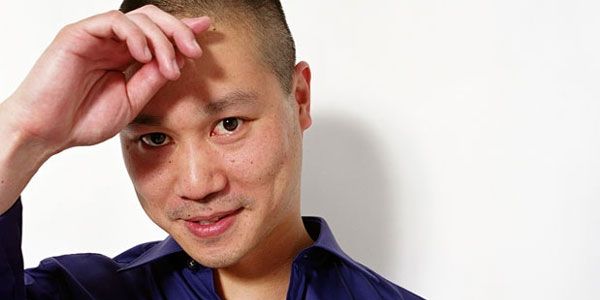
By Elizabeth Shim
Now there’s a question that probably has not been posed in the Asian American community. But I ask this question now, perhaps even on an impulse, after reading Gina Bianchini’s “Is there a female Mark Zuckerberg?” over at Fortune Magazine. I’d like to now take this question and reformulate it for an Asian American audience: Is there a female Tony Hsieh?
For those of you who have been living under a rock, Tony Hsieh is the CEO of the online megastore Zappos.com, and has been touted as one of the most successful Internet entrepreneurs of our time. Before he turned 25, he had already sold his company, LinkExchange, to Microsoft for $265 million. It’s also said he made $214 million from the sale of Zappos to Amazon. He has also built a company that takes both customer and employee happiness as its core mission, and building a corporate culture that’s evidently fun, quirky, and the talk of the media. The New York Times marveled at his “unorthodox way” of doing things in an article earlier this year, and even put in a good word about his best-selling book Delivering Happiness, a shortcut guide to profits, passion and purpose for would-be entrepreneurs.
Much like Bianchini’s “Is there a female Mark Zuckerberg?” perhaps my question is hard to answer simply because it’s the wrong question when addressing a female, Asian American audience (which is basically what I’m trying to do here). Zuckerbergs and Hsiehs are statistically rare, and not every entrepreneur is trying to be one. We all have our own ways to our destination, and yet I feel there hasn’t been enough front and center attention on Asian American women leaders, not only in tech but also in the overall picture. Is it because there aren’t enough compelling personalities? And not to cave into stereotypes of women, but are we not as daring as risk-takers? As Asian American women, is there more pressure to not let our freak flag fly?
I don’t want to say rigid rules of social conformity have predetermined our course, or that a play-it-safe mentality has most Asian American women taking conventional routes to the life and long-term. But I have noticed that in our community success and stability are sometimes used interchangeably, when they’re actually two separate phenomena. Steve Jobs’ “Stay hungry, stay foolish” advice is not something that can be taken seriously if security is at stake. And maybe for some that’s a wise reaction. Hunger isn’t fun, and we shirk foolishness whenever we can, a survival call that helps us to stay out of harm’s way.
But maybe Jobs was onto something. At least, I’d like to think so. And like Jobs before them, perhaps Hsieh, Zuckerberg, and anyone else who’s building our tomorrow today is in on the secret too, which may not really be a secret but a reality that most of us choose to ignore, but is always there, waiting for our next move.
ABOUT THE AUTHOR: New York-based blogger and freelance journalist Elizabeth Shim has written for various online media, including Koream Journal. She has written extensively about Chinese contemporary art, Korean pop culture and society for Seoul magazine in Korea, and on her proprietary blog, GlobalAsianCulture.com.







